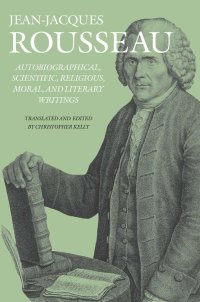
Ebook: Autobiographical, Scientific, Religious, Moral, and Literary Writings
- Tags: Philosophy, Aesthetics, Analytic Philosophy, Consciousness & Thought, Criticism, Eastern, Epistemology, Ethics & Morality, Free Will & Determinism, Good & Evil, Greek & Roman, History & Surveys, Individual Philosophers, Logic & Language, Medieval Thought, Metaphysics, Methodology, Modern, Modern Renaissance, Movements, Political, Reference, Religious, Social Philosophy, Politics & Social Sciences, Politics & Government, Elections & Political Process, Ideologies & Doctrines, International & World Politics, Political Science
- Series: The Collected Writings of Rousseau 12
- Year: 2007
- Publisher: Dartmouth
- City: Burlington, VT; Farnham, England
- Language: English
- pdf
Newcomers to Rousseau's works and those who are familiar with his writings will find something to surprise them both in this wide variety of short pieces from every period of his life. Among the important theoretical writings found here are the "Fiction or Allegorical Fragment on Revelation" and the "Moral Letters," which are among Rousseau's clearest statements about the nature and limits of philosophic reasoning. In the early "Idea of a Method for the Composition of a Book," Rousseau lays out in advance his understanding of how to present his ideas to the public. This volume also contains both his first and last autobiographical statements. Some of these writings show Rousseau's lesser-known playful side, including his comic fairy tale, "Queen Whimsical," or in works like "The Banterer," in which he challenges readers to guess whether the work they are reading was written by an author who is "wisely mad" or by one who is "madly wise." When Rousseau was challenged to write a merry tale, "without intrigue, without love, without marriage, and without lewdness," he produced a work considered too daring to be published in France. He also ponders the possibilities for and consequences of air travel in "The New Daedalus."
Bernhard Kuhn's study uncovers a fundamental connection between the autobiographies and scientific writings of Rousseau, Goethe, and Thoreau that refutes the now entrenched thesis of the 'two cultures.' As he examines these three representative writers, Kuhn reveals the scientific character of autobiographical writing while demonstrating the autobiographical nature of natural science. An unfolding drama emerges, in which Romantic Period writers are seen preserving what modern culture is determined to break apart.
Bernhard Kuhn's study uncovers a fundamental connection between the autobiographies and scientific writings of Rousseau, Goethe, and Thoreau that refutes the now entrenched thesis of the 'two cultures.' As he examines these three representative writers, Kuhn reveals the scientific character of autobiographical writing while demonstrating the autobiographical nature of natural science. An unfolding drama emerges, in Read more...
Bernhard Kuhn's study uncovers a fundamental connection between the autobiographies and scientific writings of Rousseau, Goethe, and Thoreau that refutes the now entrenched thesis of the 'two cultures.' As he examines these three representative writers, Kuhn reveals the scientific character of autobiographical writing while demonstrating the autobiographical nature of natural science. An unfolding drama emerges, in which Romantic Period writers are seen preserving what modern culture is determined to break apart.
Bernhard Kuhn's study uncovers a fundamental connection between the autobiographies and scientific writings of Rousseau, Goethe, and Thoreau that refutes the now entrenched thesis of the 'two cultures.' As he examines these three representative writers, Kuhn reveals the scientific character of autobiographical writing while demonstrating the autobiographical nature of natural science. An unfolding drama emerges, in Read more...
Abstract:
Examining the autobiographies and scientific writings of Rousseau, Goethe, and Thoreau as representative of their ages, this book challenges the entrenched thesis of the 'two cultures'. It reveals Read more...
Download the book Autobiographical, Scientific, Religious, Moral, and Literary Writings for free or read online
Continue reading on any device:

Last viewed books
Related books
{related-news}
Comments (0)